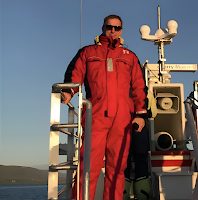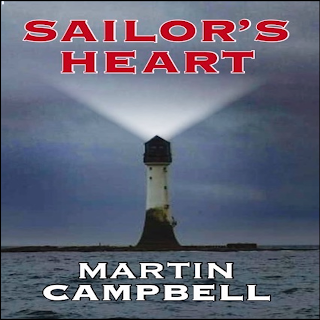Why I Write Historical Fiction - A Guest Blogpost by Martin Campbell
Martin Campbell was bornin Greenock, Scotland. He worked asa psychologist and university lecturer in London, New York, Edinburgh and StAndrews. His first historical fiction novel, Sailor’s Heart, is availablein paperback, Kindle and as an audiobook from Amazon. His next book 1856: Croton Oil and Pecuniary Profit will be published in June 2024.
Besideswriting, Martin also enjoys sea fishing and playing poker, with little returns oneither of these activities.

Iwrite historical fiction by accident. Iam not a historian, nor a novelist. I ama psychologist.
Fiveyears ago, while walking around the largest artificial lake in the UK,surrounded by the largest man-made woodland in Europe, I met a very old man, afellow walker.
“Terriblewhat they did to those poor sailors down there,” was the first thing he saidto me, pointing at the lake and shaking his head.
Itwas a choice between checking my watch and quickly moving on, or finding outwhat the hell he was talking about.
That random comment about sailors became, for me, aresearch interest, then an almost obsessive need to know about a little-knownaspect of WWII naval history. I discoveredthat the British Admiralty had set up an onshore psychiatric facility, HMS Standard,to "recycle" Royal Navy sailors who had broken down. These were men who had suffered “nervousexhaustion” or “combat stress” in battle.
It took me two years of research in naval archivesand psychiatry journals to sort out historical fact from fiction and to findout what happened to sailors at this facility. The fact was more incredible than anyfiction.
The remains of HMS Standard nowlie at the bottom of the lake, Kielder Water, after the valley was flooded whena dam was built.
My first thought was to publish my research in oneof the many reputable psychology or history journals,where the story would be read by a handful of academics and students and justas quickly forgotten. The more researchthat I did, however, the more I became convinced that this important piece ofhistory should be made more relatable and, above all, more accessible to awider audience.
I hadthe basic historical facts about what was referred to in academic writing ofthe time as The Kielder Experiment,or A Submerged Site of Therapeutic Endeavour. These facts alone told a remarkable story, butI was keen to fill in the gaps. I wantedto explore the background to “the experiment”, the people involved, theirmotives and emotions.
In myprofessional life, I was familiar with research methods: systematic reviews ofevidence, testing hypotheses and investigating causal relationships. To write a readable dramatization of real eventsat HMS Standard needed a very a different approach to research, however. What was required were fine details, minutiaeof the past that described and explained why the people–the doctors, the navy officersand the sailors of the time–behaved the way that they did. Myexploration of the WWII medical and historical records, revealed littleinformation about day-to-day life in this isolated facility, set in moorland, 30 miles from the nearest town.
There were many aspects of local and national life duringwartime that I had never considered until I began writing. What did people wear, how did they speak,what did they eat, how did they suffer during the war, what were theirattitudes? The most important of thesequestions, for purposes the book at least, was how the general public and theRoyal Navy viewed sailors who were no longer able or no longer willing to fightfor their country in a time of war. Werethey men who had reached a psychological breaking point, in need of treatmentand recovery? Or were they all justcowards, malingerers and poltroons, not to be pitied but despised? Are these views different today?
HMS Standard in NE England was where 842 men who hadbroken down at sea were received and "processed" between 1941-1944. Some men were never returned to duty. These were the basic statistics that got mestarted in writing historical fiction.
I can honestly say that I have learned as much about “human nature” inall its forms in my five years of historical research and writing as I havefrom my thirty years working as a psychologist.
I hope that readers learn as much fromthe book Sailor’s Heart as I did from writing it.

Find out more about "Sailor's Heart" here.



